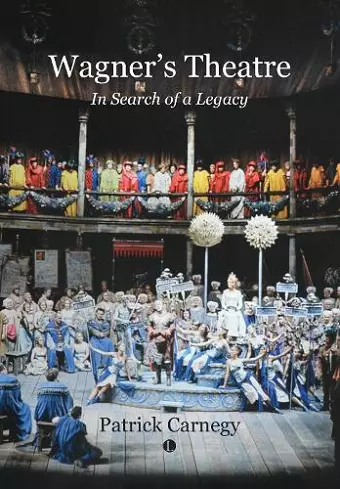Wagner's Theatre
In Search of a Legacy
Format:Hardback
Publisher:James Clarke & Co Ltd
Published:25th Apr '24
Currently unavailable, our supplier has not provided us a restock date

In Wagner's Theatre, Patrick Carnegy presents the turbulent story of Wagner and his interpreters over the course of the twentieth century. Carnegy gives vivid accounts of Gustav Mahler's radical reinvention of the Wagnerian stage, and of the post-war rehabilitation of Wagner and his work after Hitler's appropriation. He also offers sharply written reappraisals of those great Wagnerian conductors Klemperer, Toscanini, Karajan and Solti. Carnegy provides revealing accounts of the inside-workings of the Royal Opera House and of English National Opera at troubled points in their recent history. In a fascinating conversation with Sir Michael Tippett, the composer talks with unique authority about the problems facing would-be musical dramatists today. Wagner's Theatre is an essential insight into how interpretations of Wagner have developed, and how we can respond to them.
This is a book for all who love Opera - that combination of music, drama, word and song, story-telling and the deep workings of the unconscious. Who better than Patrick Carnegy to investigate this mysterious and elusive world? He delves into German Shakespeare, the first Ring of 1876, Mahler and Roller's 'right to come up with answers undreamt of by the composer', through to more recent times - four great conductors, Opera in London, and Michael Tippett. All endlessly fascinating. Sir John Tomlinson, Wagnerian bass-baritone Wagner's Theatre is a front-row report of the landmark stagings of Wagner´s work, interspersed by new discoveries around stage design and technology. Carnegy's description of highlights from the productions is a stimulating exploration into the historical, musical, and political background of Wagnerian opera-staging, and thoroughly engaging reading. It is entertaining, but also highly informative for Wagner fans and experts alike. Eva Rieger, author of Minna Wagner: A life, with Richard Wagner A treasure trove of fascinating insights, this engaging book explores Wagner's theatre from many different angles. At its heart is a tantalisingly evocative chapter on the groundbreaking 1903 Mahler/Roller Vienna production of Tristan und Isolde, as well as vivid assessments of productions by Herz, Wieland Wagner and Cherau, and a brilliant elucidation of Syberberg's 1982 Parsifal film. Finally, there is a lovely quote by Michael Tippett of having learnt from Wagner how to fill the stage with music (the glorious sunlit opening of Act 2 Midsummer Marriage). Anthony Negus, Conductor, Coach, Music Director Longborough Festival Opera Carnegy writes with all the authority and insight one might expect from someone so intimately involved with the theory and practice of opera production over a long and distinguished career. Wagner's Theatre is simply a 'must have' for anyone interested in not just Wagner himself but also the wider history of, and possible future for, opera as drama. This is a wonderful collection of essays, offering us a cornucopia of fine scholarship, sharp critique, and pragmatic observation, all beautifully written and illustrated. Peter Tregear, Conductor and Principal Fellow, Melbourne Conservatorium of Music About [Carnegy's 2006 book] Wagner and the Art of the Theatre, Pierre Boulez said . . . that he truly believed it to be 'one of the best documented publications in all the recent literature on Wagner.'. It still is. With even richer documentation, a third of it this time in colour, this new book ventures into broader ramifications of Wagner's legacy. John Deathridge, from his Introduction to Wagner's Theatre Patrick Carnegy gives vivid accounts of the radical reinvention of the Wagnerian stage, and of the post-war rehabilitation of the composer and his work after Hitler's appropriation. Mastersingers newsletter 04/2024 ' . . . [Carnegy's] enthralling exploration of the intricacies of the process whereby Hoffmann's original sketches for the sets of the Ring have only recently come to light are greatly to be welcomed.' 'This finely nuanced account [of the Mahler-Roller Tristan und Isolde in Vienna, 1903] is one of the best I have read . . . .' '. . . highly informative and lively written essays on key conductors of the 20th century - Karajan, Toscanini, Klemperer and Solti . . .' Simon Williams In Wagner Notes, Journal of Wagner Society New York, Volume XLVIII, No. 4, July 2024. Thanks to Wagner's Theatre, we know that Pringsheim defended the master's creation by striking a sceptic on the nose with his beer mug, thereby earning the sobriquet "Schoppen-hauer" (tankard-brawler) and engendering that rarest of things, a good German pun. Better still, that Otto Klemperer, remembered in later life as the austere and gloomy colossus of the magisterial tempo, was soothed on his arrival in Los Angeles in 1933 by the wife of an orchestra manager who chirped "We'll have to call you 'Klempie'." "You may call," came the reply, "But I won't come." Jonathan Gaisman In The Critic Magazine, 76, August/September, 2024
ISBN: 9780718897437
Dimensions: unknown
Weight: unknown
179 pages